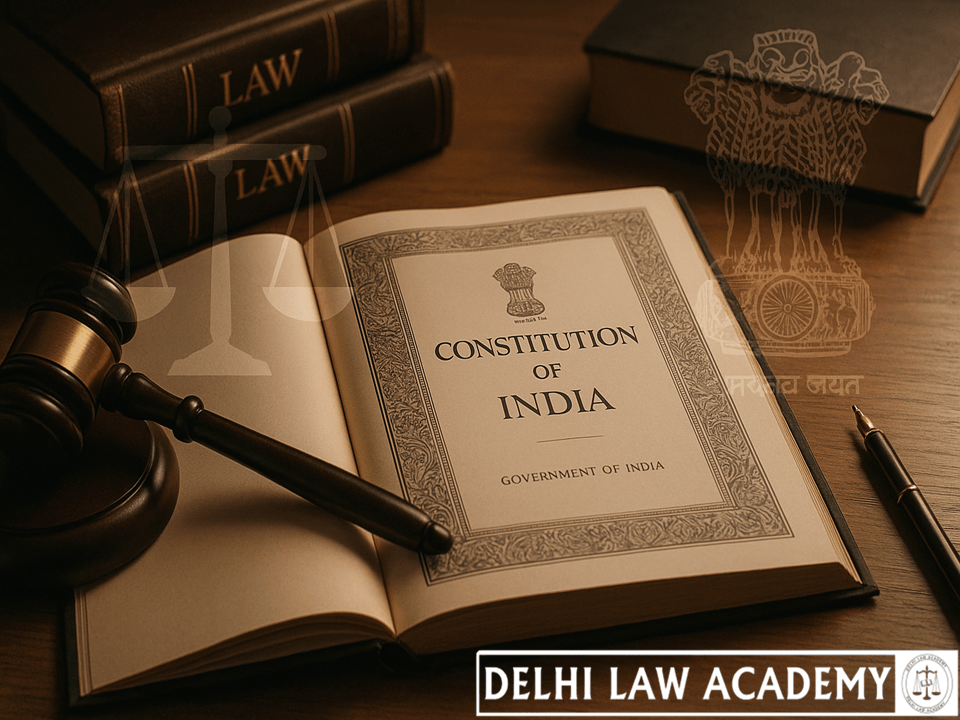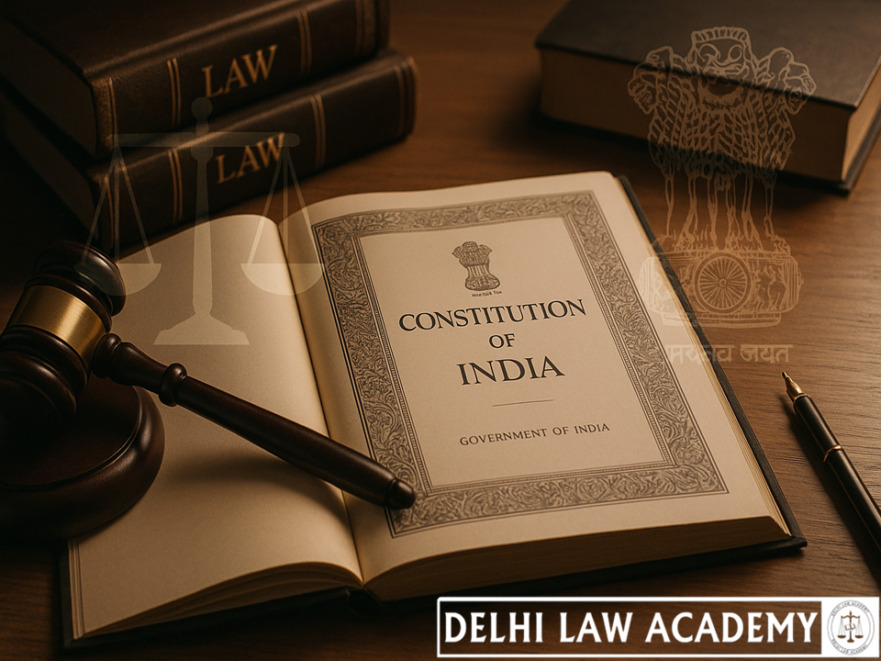
📘 DIRECTIVE PRINCIPLES OF STATE POLICY (DPSPs)
Articles 36–51 of the Constitution of India | Delhi Law Academy Jaipur
⚖️ Notes for Judiciary Exam Aspirants
Presented below is the unaltered text formatted for clarity and readability.
Topic: DIRECTIVE PRINCIPLES OF STATE POLICY Delhi Law Academy Jaipur presents below for aspirants of RJS, DJS, PCS(J) and other Judicial Services throughout India a short Note on the Directive Principles of State Policy. ****************** DIRECTIVE PRINCIPLES OF STATE POLICY Article 36 • In this Part o “State" has the same meaning as in Part III Article 37 • Provisions in this Part o shall not be enforced by any court • Principles laid down in this Part o are fundamental in governance of the country • It shall be the duty of State o to apply these principles in making laws Article 38 • State shall strive to promote welfare of people o by securing a social order in which justice, social, economic and political shall inform all institutions of national life • State shall strive o to minimise inequalities in income and o to eliminate inequalities in status, facilities and opportunities Article 39 • State shall direct its policy towards securing that (a) • citizens, men and women equally, o have right to an adequate means of livelihood (b) • ownership and control of material resources of community are so distributed o as best to subserve the common good (c) • operation of economic system does not result o in concentration of wealth and means of production to common detriment (d) • there is equal pay for equal work o for both men and women Implementation of clause (d): • Equal Remuneration Act 1976 (e) • health and strength of workers and tender age of children are not abused (f) • childhood and youth are protected against exploitation Article 39A • State shall secure that o operation of legal system promotes justice o on a basis of equal opportunity • State shall provide free legal aid o to ensure that opportunities for securing justice are not denied to any citizen o by reason of economic or other disabilities Note: • Article 39A was inserted by the 42nd Amendment Act 1976 Implementation: • Legal Services Authorities Act 1987 Article 40 • State shall take steps o to organise village panchayats and o to endow them with powers and authority to enable them to function as units of self-government Implementation: • 73rd Amendment Act 1992 Article 41 • State shall o within its economic capacity and development • make effective provision for securing o right to work o right to education o right to public assistance in cases of unemployment, old age, sickness, disablement, and undeserved want Article 42 • State shall make provision o for securing just and humane conditions of work and o for maternity relief Implementation: • Maternity Benefit Act, 1961 Article 43 (1) • State shall endeavour to secure o to all workers agricultural, industrial or otherwise work a living wage a decent standard of life full enjoyment of leisure and social and cultural opportunities Implementation: • Amendments to Minimum Wages Act 1948 • Payment of Bonus Act 1965 (2) • State shall endeavour to promote cottage industries o on an individual or co-operative basis in rural areas Implementation: • Khadi and Village Industries Commission Act 1956 • Handloom Board • Silk Board Article 43A • State shall take steps o to secure participation of workers in management of undertakings, establishments engaged in industry Note: • Article 43A was inserted by the 42nd Amendment Act 1976 Article 43B • State shall endeavour to promote o voluntary formation, autonomous functioning, democratic control and professional management o of co-operative socities Note: • Article 43B was inserted by the 97th Amendment Act 2012 Article 44 • State shall endeavour o to secure for citizens a uniform civil code throughout the territory of India Article 45 • State shall endeavour o to provide early childhood care and education o for all children until they complete the age of six years Article 46 • State shall promote with special care o educational and economic interests of weaker sections in particular, of SCs and STs • State shall protect them o from social injustice and exploitation Implementation: • 65th Amendment Act 1990 • 89th Amendment Act 2003 • National Commission for SCs • National Commission for STs • SCs and STs (Prevention of Atrocities) Act 1989 Article 47 • State shall regard o raising of level of nutrition o raising of standard of living of people o improvement of public health • as its primary duties • State shall endeavour o to bring about prohibition of consumption except for medicinal purpose o of intoxicating drinks and drugs injurious to health Article 48 • State shall endeavour o to organise agriculture and animal husbandry o on modern and scientific lines • State shall take steps for o preserving and improving the breeds and o prohibiting slaughter • of cows and calves and other milch and draught cattle Article 48A • State shall endeavour o to protect and improve environment and o to safeguard forests and wild life Note: • Article 48A was inserted by the 42nd Amendment Act 1976 Implementation: • Wildlife(Protection) Act 1972 • Forest (Conservation) Act 1980 • Environment (Protection) Act 1986 • Water (Prevention and Control of Pollution) Act 1974 • Air (Prevention and Control of Pollution) Act 1981 Article 49 • It shall be the obligation of State o to protect every monument or place or object of artistic or historic interest declared by Parliament to be of national importance o from spoliation, disfigurement, destruction, removal or export Implementation: • Ancient and Historical Monuments and Archaeological Sites and Remains Act 1958 Article 50 • State shall take steps o to separate judiciary from executive o in public services of State Implementation: • Criminal Procedure Code 1973 o Judicial powers have been taken away from executive authorities like Collector, Tehsildar Article 51 • State shall endeavour o to promote international peace and security o to maintain just and honourable relations between nations o to foster respect for international law and treaty obligations o to encourage settlement of international disputes by arbitration *************** SCOPE OF DIRECTIVE PRINCIPLES • Minerva Mills v. Union of India [1980 SC] Decision • ‘Harmony and balance o between the Fundamental Rights and the Directive Principles o is an essential feature of the basic structure of the Constitution • They together constitute o the core of commitment to social revolution • The Constitution is founded o on the bedrock of the balance between the two’ **********
📚 For detailed Constitution notes & Judiciary preparation materials, visit Delhi Law Academy
📘 Stay Ahead with Delhi Law Academy!
Get access to free monthly current affairs, read our insightful blogs,
and explore free study resources prepared by experts at DLA Jaipur. 🚀
💬 FAQs — Directive Principles of State Policy (Articles 36–51)
Common long-tail questions answered for judiciary exam aspirants about DPSPs (Articles 36–51) — their scope, meaning, and landmark cases.
They are non-justiciable (not enforceable by courts) but are fundamental in the governance of the country, as stated in Article 37.
Search phrase: “What are Directive Principles of State Policy articles 36 to 51 explained”
The Supreme Court in Minerva Mills v. Union of India (1980) held that a balance between Fundamental Rights and DPSPs forms part of the basic structure of the Constitution.
Search phrase: “Difference between Fundamental Rights and Directive Principles in Constitution”
They cover areas like equal pay for equal work, prevention of child labour, right to work and education, living wages, and fair working conditions.
Search phrase: “Economic and social justice Directive Principles Articles 38 to 43 explained”
It was inserted by the 42nd Amendment (1976) and implemented through the Legal Services Authorities Act, 1987.
Search phrase: “Article 39A free legal aid Directive Principle meaning”
It aims to unify personal laws based on religion, caste, or customs, ensuring equality and gender justice in civil matters.
Search phrase: “Article 44 Uniform Civil Code meaning and significance”
Laws like the Environment (Protection) Act 1986, Forest (Conservation) Act 1980, and Wildlife Protection Act 1972 were enacted in pursuance of this article.
Search phrase: “Article 48A environmental protection Directive Principle explained”
📚 For more Constitution and Judiciary exam notes, visit Delhi Law Academy
Contact us
📍 Delhi Law Academy – Jaipur Branch
6C, Tower 2, Coaching Hub, Pratap Nagar, Jaipur – 302033
📞 Phone:
+91 9911916552
+91 8447285606
✉️ Email:
contactus@delhilawacademy.com

